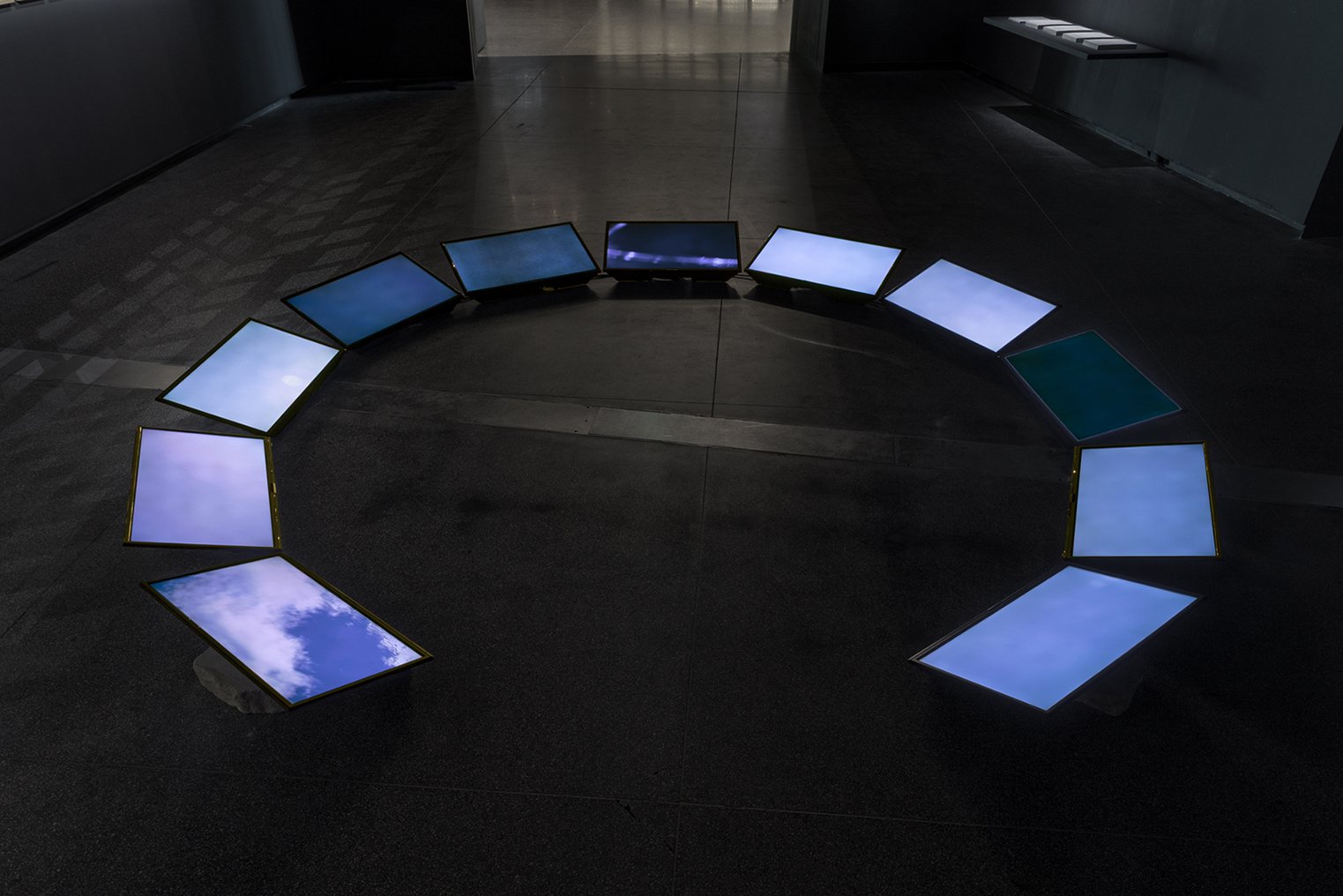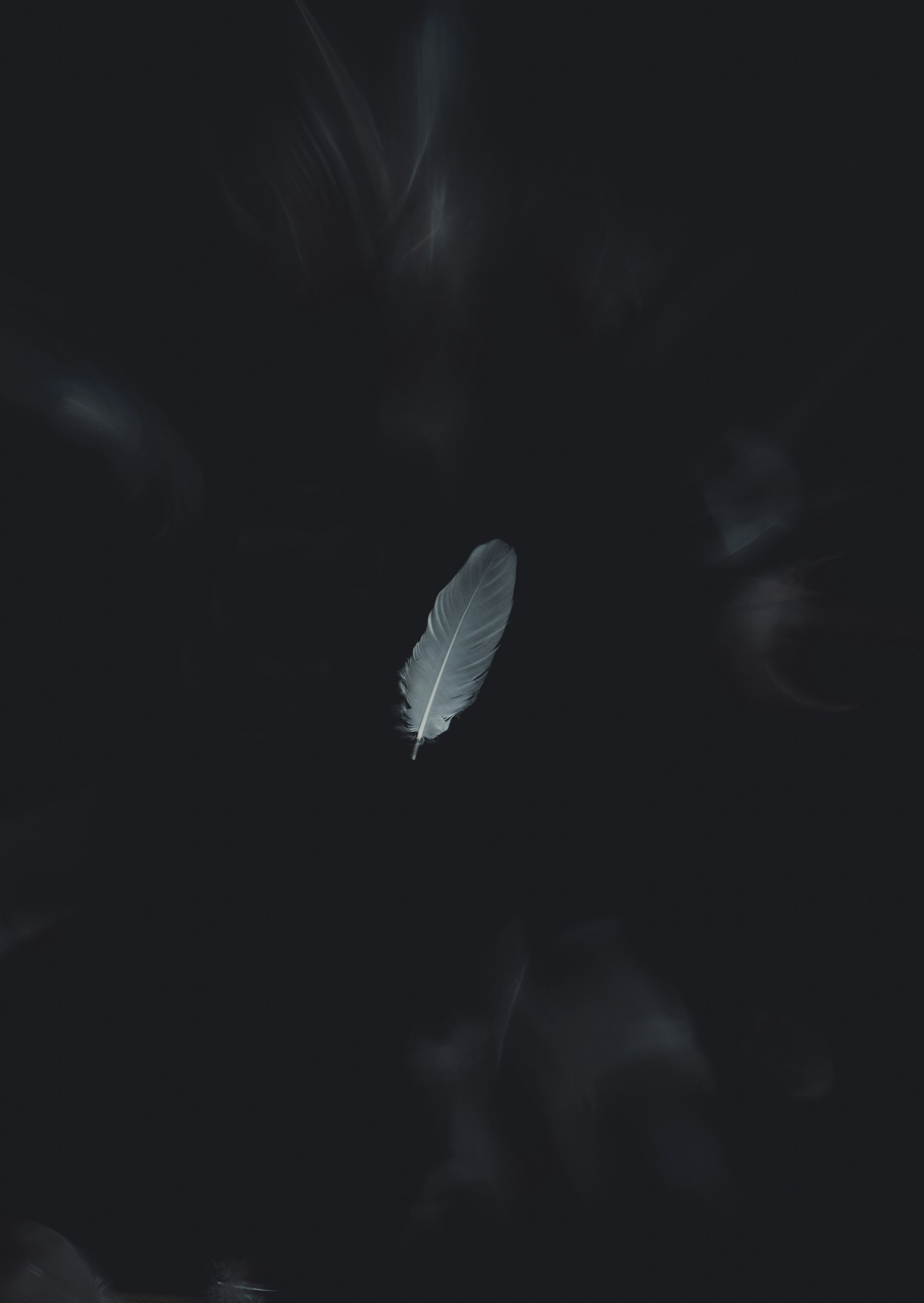The Matriarch
Shania Lourdes
The room was dark, air thick enough for my breath to catch. My feet were moving before I could even register the motion. Something was pulling at me. A tether drawing me to those eleven screens that sat in an anticlockwise circle. Snippets of a video played on loop.
There was a hum—low and unassuming. A small buzz whispered through my ears, forcing me through a set of memories I wasn’t prepared to revisit.
The buzz grew louder. Sharper. Until it turned into cries. The kind that rip so deep from within your chest that your knees buckle. A pain that can only come from the loss of someone you love.
I don’t remember how long I stood in front of those screens, transfixed by something I couldn’t quite explain. I was waiting, anticipating for a movement, for the screens to split open and coax me into a time where the walls weren’t closing in around me. When time didn’t feel so terminal, and the safety blanket that was once delicately braided wasn’t unravelling at the seams.
Denial
If I didn’t blink, I could almost feel her—that same warm presence and floral scent, in that same house that hosted countless family gatherings with a table full of food, bickering about what movie to watch or which game to play.
I could almost see her sitting at the head of the table, flipping through the newspaper like she had all the time in the world. I would sit in my usual spot beside her, laptop opened in front of me, cursor flashing impatiently.
Her soft breathing synced with my heartbeat.
There was no urgency or expectation. No voices telling me to have my future planned out before I even finished high school. And certainly no ATAR looming over my head, like a sword waiting to drop.
In this moment, there was only a steady presence. A woman who held the answers to every problem I had faced, who could steady my shaking hand with a simple squeeze, and whose intelligence was unmatched by anyone I ever knew. She always had that air about her—all-knowing without ever shoving it in anyone’s face. Graceful without fault.
The screens were blinding. I wanted to believe I was still there. In that house where the aircon made us bundle up in a cacophony of blankets, even on the hottest days of summer—all while The Bold and the Beautiful could be heard from the kitchen.
I thought that there was more time, that I had more time with her. Because, in some twisted way of thinking, I believed she would always be around. That she would always be a phone call away.
If I kept listening to the static, maybe I would hear her voice. If I strained hard enough, maybe she could give me the answers I was looking for. The reassurance I needed.
I stood there waiting for a door to crack open.
Anger
But it never did.
The static grew louder. A fierce and uncontrollable ringing pierced deeper than words ever could.
A stable career. That’s all I ever heard people talk about. How the success of your future is based upon the stability of your future job. Criminal psychology was stable. It was reliable. It was secure. It was everything people expected of me.
Being labelled ‘smart’ has people hold you to a higher standard than others. They force you into a box that becomes increasingly unattainable as time passes, driven by the pursuit of academic perfectionism.
Fear of failure became a way of life, and academic burnout became inevitable.
At times, I couldn’t help but wonder how she did it—how she made it look so easy. To carry problems like they weighed nothing, to hold the role of the Matriarch so well that no one ever took a second glance. She took on the expectations, pressure and burdens without a single complaint.
She embraced the challenge of battling men and their briefcases, taking on the role of a secretary stenographer. She slowly worked her way up and became a valued asset, earning respect like it always belonged to her. She never strived for anything less than perfection, a passage paved by the generations built before her. Wife. Mother. Grandmother. Protector. She was everything she was meant to be and more.
It was those qualities that made it seem like she had all the answers. An oracle-like existence. Something so divine, it felt like you were in the presence of an angel. A higher power that was crafted for the sole purpose of guidance.
But, sometimes, I couldn’t help but wonder—did she ever feel trapped? Did she ever wish to be someone different? Was there another version of herself she longed to be?
The world had determined who she had to be. She conformed to the expectations folded into her DNA by the reins of life. The same world that was screaming at me to do the same.
Be polite. Dignified. Respectful of your elders, even if it meant bending your morals to appease them. Be grateful. Never complain. Be accomplished, but never shove it in anyone’s face.
It was a world that never left any room for mistakes.
A woman’s world.
I wanted to scream. At her absence. At the forced milestones that felt more like burdens—finishing my degree, choosing a career, getting married, settling down, becoming a version of myself that would be applauded.
The noble daughter.
The overachieving granddaughter.
I was clawing for a way out, to get rid of the shackles that chained me to an identity laid out by a world determined to tear me down.
The static grew louder. It wrapped around my bones, tighter and tighter until it left a ringing in my ears.
The thread was unravelling.
I needed a way out.
Bargaining
But I couldn’t find one.
I was sewn into an identity that was no longer my own. One that felt detached from the version of myself I had built.
I was trapped.
In time.
In doubt.
In a reality I couldn’t escape.
I was no longer in a STEM degree.
The longing to create stories and build worlds finally took over. The dream that seemed so unattainable knocked on my door and I finally answered.
This degree felt different though, easier in a way. There were no awkward conversation starters or pauses to grasp onto some sort of similarities with people my age. It made clicking with strangers easier because there was common ground, connections deeply rooted in a shared love for words—so why am I still feeling like this? Why am I still suffocated by pressure?
Why did it still feel like a mistake?
I was haunted.
Eleven.
Eleven.
Eleven.
I whispered it like some sort of prayer. Maybe if I repeated it enough, she would appear. Like a sign that could test the limits of reality. A summoning that was more than just a figment of my imagination.
I searched the glow of the screen for something.
A shadow.
A feather.
A ribbon.
My body swayed, prepared to fall into that same loop. Begging to be pushed into another reality—one where she was still here.
I was no longer in the gallery. I was back in my room, pacing around with my phone clenched in my hand so tight I developed a tremor. It was interview day. My first ever interview in an industry I was hoping to make my mark on. Publishing would open doors to all kinds of opportunities. But maybe I was out of my element. Maybe I was in over my head, trying to grasp onto something that didn’t truly belong to me.
I was waiting.
Hoping.
Wishing.
For that one message.
All the best for your interview my darling. Don’t stress. Call me when you’re done. Love you heaps. Xxx
She always sent them. It had become routine. When a big milestone was coming up, she would send a message bright and early. It always worked to calm every single nerve in my body. I always expected to wake up and see it on my screen.
This time, there was nothing.
No vibration.
No precisely chosen emoji.
No message.
I searched and searched and searched. For any sort of sign. For any indication that she was around. Watching over me. Doing something. Anything, to show that she was there.
If I find a feather around, I’ll know she’s here.
If I see the number eleven, I’ll know she’ll be nearby.
If I think it enough, she’ll come back.
She had to come back.
For at least one more hug. One last conversation I could cling to. Another prolonged moment with the promise of tomorrow. Certainly not a phone call that was buried underneath layers of tears and heartbreak.
If only.
What if.
Maybe.
The static pulsed.
Harsh and rapid.
Vicious in every sense of the world.
It consumed me.
The thread snapped.
Depression
And then there was nothing.
Pure and utter silence. The weight of something so harsh it felt impossible to breathe. Reality was pressing against me, forcing me to come to terms with something I wasn’t ready to accept.
I was numb—burnt out. Exhaustion curled itself around my limbs and grief threaded its way into my bones. Every part of me felt heavy. Burdened. Forced to walk in a world she no longer existed in.
The truth was harsh.
But reality was harsher.
Conversations became harder to maintain. My body was lethargic with a tiredness that sleep couldn’t fix. There was a glass wall between me and everyone in my life. I could see everything pass me by but didn’t have it in me to care.
The right path. That’s all everyone ever seems to talk about. It was the high school teachers reminding you how important your studies were. It’s your peers discussing their life trajectories. It’s the pressure you put on yourself to be perfect.
The perfect student. The perfect daughter. The perfect granddaughter.
It begs the question: what is the right path? How could you know what you’re destined for when you’ve barely begun living?
I assumed that it would feel right. That everything would fit into place, like finding a missing puzzle piece. But this industry is anything but easy. It wasn’t built for ease or reassurance, but to test your patience: make you question if it was really worth all the hardship for a sliver of success in an ever-changing world. One that was slowly being taken over by an intelligence system.
I was never good at making decisions. Overthinking was written into my DNA. Time had always been my fear—watching life pass me by because I was too far inside my own head.
I was never good with time, but my grandmother was. She always knew things that a normal person wouldn’t even think to consider.
I could still feel the unease of that hospital room. It was stale, cold and way too bright. The small coded buzz of the doors haunted my memories. I never liked hospitals, and she didn’t either.
It had been a long five days and deep down I was preparing myself for the worst. Like something in me just knew it wouldn’t be long. But I still had some hope. I was waiting on a miracle that wasn’t going to come.
That day, I had no idea it would be the last time, because when does anyone ever know? I hoped I had more time. Prayed for it.
But she knew.
Her eyes lingered on me when I left that night. A look that I couldn’t comprehend. As if she was trying to say something without moving her lips.
At that time, I didn’t understand. But when that dreaded phone call came through, I finally understood every unspoken word.
There was a sudden crack in my chest. A permanent tear. A missing limb inflicting only phantom pain. It would always be there, like a soreness from a bone that never healed right.
Milestones hurt to think about now.
Birthdays. Graduations. Book launches. Future weddings. She would be absent from it all. She was supposed to be eternal. A constant in a world full of noise.
The screens began to blur.
Eyes glossed with tears.
The Matriarch had fallen.
Acceptance
I was still struggling to breathe. It didn’t matter how much time would pass, this ache would always be a part of me.
The screen blinded me. My tears had dried, leaving evidence down my cheeks. A fatal reminder of the cracks against my heart. Only, more visible.
But then I saw it.
It was a glimpse, an overwhelming presence that couldn’t be mistaken. My grandmother was here, standing right beside me.
My chest was still heavy, but the pressure eased just enough to breathe again. My muscles relaxed, pliant enough to push away the exhaustion.
I wasn’t alone.
She was here, like she always was when I needed her. It made me realise that I wasn’t running out of time. Not really. My twenties marked the beginning of the freedom to learn, experience life, and shape my own views and understanding of where I was meant to be.
I needed to be living. Stepping out of the comfort zone I’d locked myself in for as long as I could remember. She reminded me that I needed to break free.
The screens hummed, flicking in that constant loop. But, this time, I wasn’t waiting for them to split open and take me back to the past.
Instead, I was focused on moving towards the future. My future. To not succumb to the anxieties of what-ifs and the uncertainties of life. I wouldn’t wait for the past to swallow me whole. I wouldn’t combust at veering the slightest bit off course.
I now realise that I was exactly where I was supposed to be. Learning, growing, becoming. There was so much more to do. And this was a pretty good place to be—which is exactly what my grandmother was trying to tell me.
Take a breath.
Her voice was like leaning into a hug I didn’t know I needed. My eyes shut, my shoulders slouch in relief.
She was always going to be around. Not like a tether, clung to the hopes and dreams of what could’ve been, but more akin to a thread.
A single strand of yarn tied to my finger.
She gave me the space to breathe in the discomfort, and the reassurance that figuring things out isn’t an act of failure—it’s resilience.
Shania Lourdes (she/her) is completing a Bachelor of Arts (Creative Writing) at RMIT University. From a young age, she always had a deep love for storytelling and primarily writes fiction, with a focus on the mystery genre. She hopes to pursue a career in publishing and one day release her own novel. Her piece, ‘The Matriarch’ is a response to At the Speed of Sound (2016) by Khaled Sabsabi.
All pieces thumbnail credits: Khaled Sabsabi, At the Speed of Light 2016 (detail), installation view, Australian Centre for Contemporary Art, Melbourne. Courtesy the artist and Milani Gallery, Meanjin/Brisbane. Photograph: Andrew Curtis
Image credits: Khaled Sabsabi, At the Speed of Light 2016, installation view, Australian Centre for Contemporary Art, Melbourne. Courtesy the artist and Milani Gallery, Meanjin/Brisbane. Photograph: Andrew Curtis
Evie S (2020) A white feather floating in the dark [photography], image courtesy: Unsplash, accessed 6/10/2025



